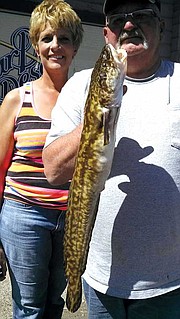Fresh News From MarDon
Here is an update on the project happening on Goose Island this Spring & Summer.
Hello from the Bird Research Northwest Field Research Team,
As you may know we are ramping up for another season of bird watching on Goose Island, but we aren't just watching the birds this year.
In years past, the field crews were monitoring the Caspian Tern colony on Goose Island from a blind located at the edge of the colony.
After years of gathering information finding out Caspian Terns are responsible for consuming millions of salmon from the Columbia River Basin each year the Bureau of Reclamation, Grant County, and the Army Corps of Engineers decided they have had enough.
The Birds were eating too many salmon and trout smolt. The amount of salmon being consumed by the terns is inhibiting the recovery of salmon populations which were initially down from people overharvesting (before fishing regulations were set), damming up the Columbia (not allowing the fish to spawn up river), and deforestation (destroying ideal spawning habitat).
Therefore in an effort to allow the salmon populations to recover we are trying to reduce the number of Salmon smolt eating birds foraging in the Columbia River.
You may ask "why don't you just shoot them?" Well, they are protected under the Migratory Bird Treaty Act. Therefore techniques used need to be approved by the United States Department of Fish and Wildlife service and alternatives need to be attempted before lethal control can be deployed.
This is what we have been doing and will continue to do this year on Goose Island.
The field crew hired through Oregon State University's Dan Roby Lab in conjunction with Real Time Research are hazing the birds from the island using ropes and flagging as well as several other hazing techniques.
The ropes and flagging, you can see from the resort, have been used successfully on other islands making the island undesirable for terns to nest.
Coupled with the ropes and flagging we have been going out every morning, afternoon, and evening to make sure they don't try to nest on areas not covered on the main island. If they do land on the island we are permitted to use a laser to scare them from wherever they are hanging out.
Goose Island is closed for recreation in the summer to allow gulls, who do not eat many fish and are also projected same as terns, to nest. A tern colony recently formed on one of the rocky islands adjacent to Goose Island which is not being hazed, but monitored for the time being.
It would be greatly appreciated if a good distance is kept while recreating in that area to avoid flushing birds, not only does it affect our monitoring without proper permits it is considered harassment. If you would like more information on this research project go to http://www.birdresearchnw.org/.
I hope this help you have a better understanding of what we are trying to accomplish on Goose Island and wish you happy camping and successful fishing.
Thanks for your support,
BRNW Field Crew



